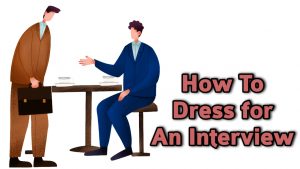Mistakes To Avoid In an Interview: A job interview is a chance for the hiring manager to analyze an applicant’s credentials, abilities, and fit for the position, as well as for the interviewee to decide if they want the job. Interviews typically consist of a dialogue with particular questions and answers about the position and the firm, but some sometimes include testing or a skills display. For the most favorable interviewing experience, adequate preparation ahead of time and a suitable manner during the interview are critical.

Everyone’s path and experience with interviews are different, but there are a few things you should avoid doing. These may sound obvious, but you’d be surprised how many people fail to perform them. Many individuals prepare for interviews by studying the firm and updating their CV and list of references. There are, however, some interview gaffes that are all too prevalent. Consider common interview blunders to avoid while preparing for your next job interview. We discuss and present examples of interview errors to avoid in this post.
Recommended: How to prepare and pass an interview
Top 11 Most Common Job Interview Errors To Avoid and How to Avoid them
1. Inappropriately Dressed: For a job interview, avoid dressing casually. Jeans and t-shirts are unlikely to be appropriate attire for a job interview. Consider a suit or dress pants with a neat button-down shirt or sweater as an alternative. When in doubt, ask the hiring manager what the company’s dress code is and use it to influence your interview attire selection.

2. Arriving Late: Everyone knows that establishing a good first impression is important when applying for jobs, but did you realize that you may make a bad first impression even before you show up for your interview? Running late demonstrates a lack of respect for the organization, the position, and even your interviewer, as well as bad time management skills.

Make an additional effort to avoid being late and to arrive on time, if not early. Plan your time so that you arrive five to ten minutes early for the interview. That way, if something unexpected happens on the way to your interview, you’ll have some time to prepare.
Recommended: How to dress for an interview
3. Bringing a Drink: Before entering your interview, put down the coffee, drink, or water bottle. If you need to eat before the interview, do so beforehand. Not only is entering with a drink disrespectful, but you should be focused on the work at hand throughout your interview: establishing a good first impression, answering questions, keeping eye contact with your future employer, and paying attention throughout the whole interviewing process.

When you have a drink in front of you, it’s easy to become distracted—for example, fumbling with the cup or missing a question while taking a sip. And, while it’s a remote chance, carrying a drink during an interview might lead to additional embarrassing mishaps, such as spilling the drink on the desk, on yourself, or even on your interviewer.
4. Making Use Of Your Phone During the Interview: Silence your phone before you go to your interview. Not only is texting during an interview impolite and noisy, but it also sends a message to your potential employer that gaining the job isn’t your top priority.

For the same reason, don’t take (or make) phone calls during the interview. Before the interview, stow your phone in your luggage to avoid the temptation to check it. If you forget to turn it off, resist the urge to switch it back on.
Also see: How to properly introduce yourself to someone
5. Being Unable To Obtain Critical Information Or Data About The Organization Or Corporation: If your potential employer inquires, “What do you know about this company?” don’t be startled. This is one of the easiest questions to grasp if you do some study before the interview.

An “About Us” section on most business websites contains information such as company history, locations, divisions, and a mission statement. Review it ahead of time to refresh your memory, then print it and read it just before your interview. Look at the firm’s LinkedIn page, Facebook page, and a Twitter feed if it has one.
6. Lie: It’s tempting to lie a little during your interview to prove that you’re the ideal candidate, but interviewers can tell when you’re lying. Your body language typically gives it away, and even if you can lie with a straight face, they’ll probe further and deeper until you can’t maintain your ground anymore.
By lying, you lose credibility and demonstrate a lack of integrity, all of which are surefire ways to be disqualified. Be truthful and honest; you have enough to offer; all you need to do now is figure out how to best exhibit your assets.
7. Paying No Attention: Allowing oneself to drift off during an interview is not a good idea. Make sure you’re rested, attentive, and ready to go. It appears that you were distracted and missed a question. Your future employer will question how you would stay concentrated for a day on the job if you can’t even keep focused during one interview if you zone out. Make an effort to stay interested if you see your attention sliding away.
Maintain eye contact with your interviewer, lean forward slightly when speaking with them, and listen actively. While you may have no trouble paying attention in a one-on-one interview in a private office, staying in tune with the interviewer in a public setting is more difficult.
Also see: How to a good conversationalist
8. Too much talking: Nothing is more annoying than an interviewee who goes on and on. The interviewer doesn’t need to know everything about your life. Keep your responses brief, to-the-point, and focused; don’t ramble; simply respond to the question.
Don’t get distracted and start talking about your personal life; your spouse, your family, or your children are not subjects you should broach. An interview is a professional scenario, not a personal one, no matter how kind, inviting, or pleasant your interviewer is.
9. Accepting frailty with trepidation: Nobody is flawless; we all have areas in which we may improve. It is hubris and ignorance to believe and declare otherwise. When the interviewer inquiries about your areas of growth, they are attempting to gauge your level of self-awareness.
The capacity to grow and widen one’s abilities, as well as self-awareness, are major markers of intellect and potential. As a result, declaring you have no weaknesses or places for growth or delivering a generic answer that doesn’t relate to you, is a deal-breaker. Investigate further, get to know yourself, and then respond.
Also see: Advantages and Disadvantages of Being a Lawyer
10. Defaming Former Employers: Make sure you’re not slamming your employer or coworkers. It’s a smaller world than you think, and you never know who your interviewer, or even your boss, knows. You also don’t want the interviewer to believe you’ll criticize his or her company if you leave on poor terms. When you’re job-hunting, you want your future employer to know that you can work effectively with others and handle problems in a mature and constructive manner, rather than insulting your coworkers or blaming others for their ineptness.
When confronted with difficult inquiries, such as “tell me about a period when you didn’t get along with a boss. What was the result, and how would you have changed it if you could go back in time?” alternatively “Have you ever had to work with someone you didn’t care for? If that’s the case, how did you address it?” Don’t revert to slamming other individuals. Instead, practice answering challenging questions.
Recommended: Things to consider before buying a laptop
11. Making An Effort To Flatter: When asked why you want to work here, the typical response is a long list of reasons why the firm is fantastic, which is intended to impress the interviewers. Flattery doesn’t work with most interviewers since they are experienced and near specialists in human behavior.
They want you to demonstrate how you are a good fit for the firm, such as how your core beliefs align with the company’s, how your skill set aligns with the job criteria, or how the company fits into your long-term career ambitions.
Recommended: How to start and keep a conversation going with a girl
Conclusion
Unfortunately, it’s all too simple to make these errors without recognizing them, and many of them are more widespread than you may believe. Prepare for your interview ahead of time so you don’t have to worry about making mistakes afterward.

Edeh Samuel Chukwuemeka, ACMC, is a lawyer and a certified mediator/conciliator in Nigeria. He is also a developer with knowledge in various programming languages. Samuel is determined to leverage his skills in technology, SEO, and legal practice to revolutionize the legal profession worldwide by creating web and mobile applications that simplify legal research. Sam is also passionate about educating and providing valuable information to people.